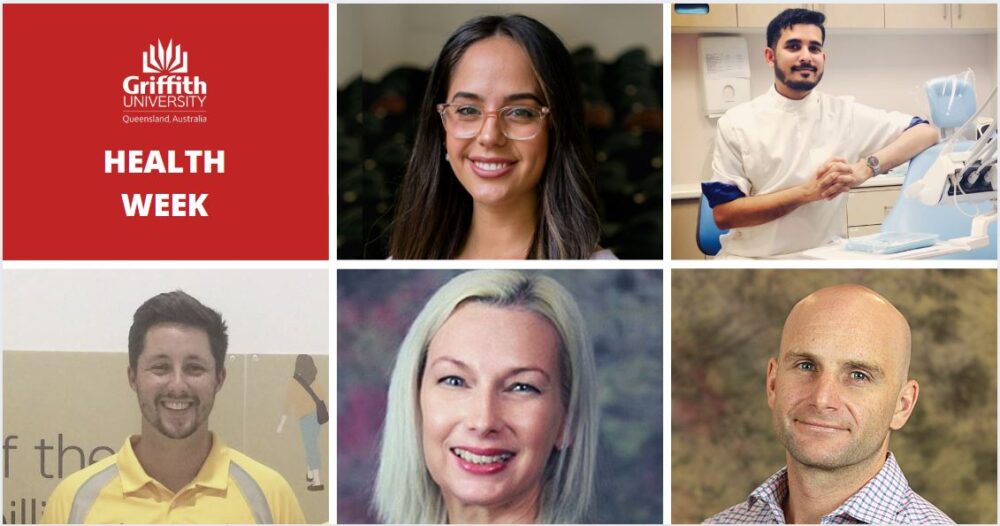Ever wondered where your career in health care might take you? We recently brought together Griffith Health alumni and academics in a virtual event to talk to us about the changing needs of Australian communities and the increasing importance of wellness as part of healthcare. Read on for a snapshot of that conversation.
Caroline Donovan is a clinical psychologist with interests in youth anxiety, depression, sleep and body image issues. As Caroline explains, there’s a difference between being mentally healthy and not having mental health issues.
“I think people often think that having mental health means that they don’t have mental health issues, so they see it as the absence of depression or anxiety and if you don’t have those things then you must be mentally healthy – but it’s not quite the same thing,” explains Caroline.
“We probably need to start thinking about wellness rather than a lack of illness. And so, it’s not just that a mental health problem is not present, but that we have a presence of positive mental states, like good coping strategies, higher levels of resilience, high levels of psychological and emotional well-being, and a positive and realistic outlook on life.
“It’s about feeling good and functioning well and being emotionally and psychologically healthy.”
Physiotherapist Mitch Hunter from the Griffith Health Clinics echoes Caroline’s thoughts, adding that physiotherapy services have adapted in recent years as more people become interested in a holistic approach to health and healing.
“In the past, the medical model was to find an individual problem in someone’s body and having standardised ways of treating that,” Mitch explains.
“Holistic health care recognises that we’re dealing with an actual person, and that their body and mind is intricately linked, so we treat the person as a whole rather than just focusing down on an individual problem we’re seeing. And if we can do that what that means is that treatment approach is individualised to that person.
“What has started to come out of it is what we call the bio-psycho-social approach, where we acknowledge that in any one presentation there is a biological component, a psychological component and a social component, and they all interlink and work off each other.”
But when it comes to health and wellness, panelist Roshan Rigby, a dietitian and PhD candidate at Griffith University says that nutrition and diet also play a part in a holistic approach to health.
“The number one, modifiable risk factor for poor health is nutrition, so as a discipline it really warrants our attention,” says Roshan.
“My research really focuses on behavioural change. I’d like to make sure people know that they can go to dietitians to change their behaviours and not just be told what to do or what to eat, but really to be counselled through that process.
“In high income countries like Australia, obesity disproportionately affects those in disadvantaged and rural areas. And this comes down to the food availability and affordability. For example, in lower socioeconomic areas, there’s a high abundance of unhealthy food options and healthy food is quite expensive, simple things like milk, coffee, fruit, and vegetables.
“A successful health care system should really be focusing more towards keeping people well, rather than responding to poor health. And that means that as a primary care provider, dieticians are really doing our part to raise awareness of the importance of good nutrition and making healthy choices easier.”
Dentist Mohit Tolani knows all too well the health disadvantages often faced by rural communities, having lived and worked in rural and regional locations since graduating from Griffith University, and launching several public health awareness campaigns in dentistry across the various towns he’s lived in.
“I feel that dentistry is an amalgamation of medicine, public health, art, and science. And what took me to dentistry in first place was the community communication aspect of it,” Mohit says.
“In my studies, I learnt that people in Sydney are 60% more likely to go to a dentist or an oral health care practitioner versus someone in the rural or regional area, which is 45%. As a clinician, I thought, I want to use my skills to the maximum. So, what can I contribute to the most? Where can I give back to the most? And I think rural and regional spoke to me, because I felt that it’s an area where there’s been neglect in the past. There’s lack of dental health literacy at the same time and accessibility is a problem in some areas.”
Mohit says that education is key when it comes to dentistry, to pass on to his patients that visiting the dentist isn’t just to fix problems they may be having with their teeth and gums; it’s also about understanding how problems in the mouth can impact the body.
“There’s more to dentistry than just drill, fill and bill – there’s an aspect where you want to appreciate the fact that this is the gateway to your general health. There are studies showing a direct link between gum disease and heart problems, and gum disease and diabetes.”



